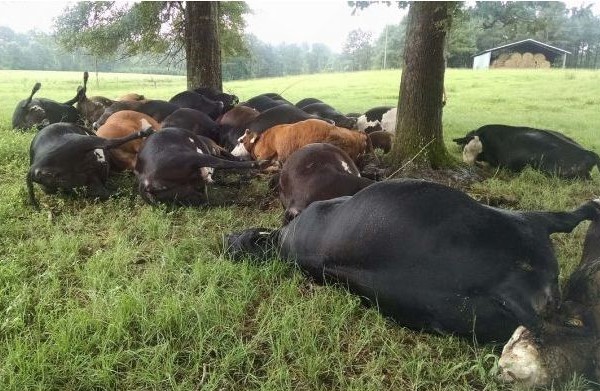

Organophosphates are chemicals used to kill insects on plants and animals. They are purely for external use but can sometimes be ingested by animals, resulting in poisoning. Organophosphate poisoning is literally a race against time if the animal is to be saved. The farmer must quickly see the signs and a veterinary doctor must be called in time for appropriate diagnosis and subsequent treatment.
Common clinical signs of organophosphate poisoning include excess salivation, constriction of eye pupil, frequent urination, diarrhoea, vomiting, stomach pains, difficulty breathing, muscle weakness, nervousness, seizure and collapse. In the last stages, this will be followed by death due to respiratory muscle paralysis that may result if the animal does not get veterinary attention in time. If it is on the skin, there will be reddening of the affected area.
Prevention and treatment
After the diagnosis, which is done based on clinical signs and a history of exposure, there are effective treatments for organophosphate poisoning. Laboratory analysis of rumen content may be done at postmortem or in search of a confirmatory diagnosis or where ligation is sought by the farmer. The latter is due to malicious causes of poisoning which are common.
The vet will use drugs like atropine sulfate and diazepam to reduce the effects of the poisons and to control seizures. They can also use emetics to induce vomiting and hence removal of the poison from the systems.
Then there are cathartics and adsorbents, which are also used to reduce further absorption. Farmers can also rely on activated charcoal to help speed up the elimination of organophosphates through faeces.
The treatment is complex, which explains why it should never be attempted by the farmers on their own but must be supervised by a qualified a vet. For example, giving emetics to depressed animals can be fatal. If the effect is on the skin, immediately wash thoroughly with clean water.
Combined farming
Organophosphate poisoning is especially common in farms that combine crop and animal production, probably due to a higher use of pesticides and poor disposal of the containers. For some reason, farmers like keeping these tins instead of disposing of them, with an excuse to later use them to carry fertiliser or seeds. If you have to keep them, thoroughly wash and store them well away from animals’ reach.
Animals are sometimes inquisitive (goats are good at this) and will want to taste water that collects in these tins or to lick. Where there is a mineral deficiency, the incidences of organophosphate poisoning are much higher, as the urge to lick or drink the content of such tins is more intense.
To prevent organophosphate poisoning, dispose of these tins in deep pits, and educate farm managers on the importance of proper disposal of insecticide tins. Also, give mineral supplements to your animals and in the unfortunate circumstance of poisoning, immediately call in a vet.
 Contact Jaguza Support
Contact Jaguza Support